Related Research Articles
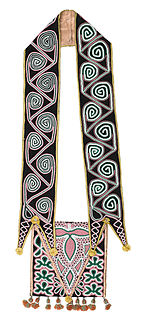
The Muscogee, also known as the Muskogee, Muscogee Creek, MvskokeCreek, Mvskokvlke, or the Muscogee Creek Confederacy in the Muscogee language, are a group of related indigenous peoples of the Southeastern Woodlands in the United States of America. Their original homelands are in what now comprises southern Tennessee, all of Alabama, western Georgia and part of northern Florida.

Okmulgee County is a county in the U.S. state of Oklahoma. As of the 2010 census, the population was 40,069. The county seat is Okmulgee. Formerly part of the Creek Nation, the county was created at statehood in 1907. The name Okmulgee is derived from the Hitichita word okimulgi, meaning "boiling waters".
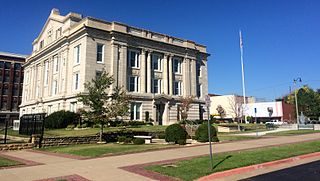
Creek County is a county located in the U.S. state of Oklahoma. As of the 2010 census, the population was 69,967. Its county seat is Sapulpa.
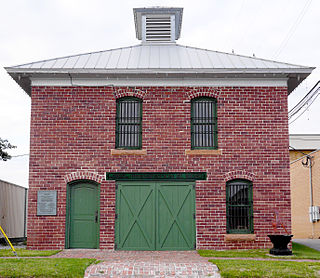
Canadian County is a county located in the U.S. state of Oklahoma. As of the 2010 census, the population was 115,541, making it the fourth-most populous county in Oklahoma. Its county seat is El Reno. The county is named for the Canadian River, which is in turn named because its earliest explorers were traders and trappers from Canada.
Pryor Creek or Pryor is a city in and county seat of Mayes County, Oklahoma, United States. The population was 8,659 at the 2000 census, compared to 9,539 in the 2010 census.
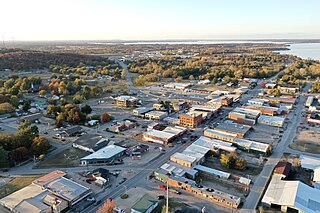
Eufaula is a city and county seat of McIntosh County, Oklahoma, United States. The population was 2,813 at the 2010 census, an increase of 6.6 percent from 2,639 in 2000. Eufaula is in the southern part of the county, 30 miles (48 km) north of McAlester and 32 miles (51 km) south of Muskogee.

Okmulgee is a city in, and the county seat of, Okmulgee County, Oklahoma. The name is from the Mvskoke word okimulgee, which means "boiling waters". The site was chosen because of the nearby rivers and springs. Okmulgee is 38 miles south of Tulsa and 13 miles north of Henryetta via US-75.

Owasso is a city in Rogers and Tulsa Counties in the U.S. state of Oklahoma, and a northern suburb of Tulsa. The population was 28,915 at the 2010 census. Originally settled in 1881 in Indian Territory, the town incorporated in 1904 just prior to Oklahoma statehood and was chartered as a city in 1972.

The term "Five Civilized Tribes" derives from the colonial and early federal period in the history of the United States. It refers to five Native American nations—the Cherokee, Chickasaw, Choctaw, Creek (Muscogee), and Seminole. These are the first five tribes that European Americans generally considered to be "civilized". Examples of colonial attributes adopted by these five tribes, which led European Americans to label them civilized, include Christianity, centralized governments, literacy in English, market participation, written constitutions, intermarriage with white Americans, and plantation slavery practices. The Five Civilized Tribes tended to maintain stable political relations with the European Americans.
The Seminole are a Native American people originally from Florida. Today, they live in Oklahoma and Florida, and comprise three federally recognized tribes: the Seminole Nation of Oklahoma, the Seminole Tribe of Florida, and Miccosukee Tribe of Indians of Florida, as well as independent groups. The Seminole people emerged in a process of ethnogenesis from various Native American groups who settled in Florida in the 18th century, most significantly northern Muscogee Creeks from what is now Georgia and Alabama. The word "Seminole" is derived from the Muscogee word simanó-li, which may itself be derived from the Spanish word cimarrón, meaning "runaway" or "wild one".
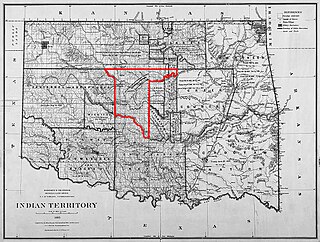
The Unassigned Lands in Oklahoma were in the center of the lands ceded to the United States by the Creek (Muskogee) and Seminole Indians following the Civil War and on which no other tribes had been settled. By 1883 it was bounded by the Cherokee Outlet on the north, several relocated Indian reservations on the east, the Chickasaw lands on the south, and the Cheyenne-Arapaho reserve on the west. The area amounted to 1,887,796.47 acres.
The Fort Smith and Western Railway was a railroad that operated in the states of Arkansas and Oklahoma.

Bridge Creek is a town in Grady County, Oklahoma, United States. As of the 2010 census, the town population was 336.
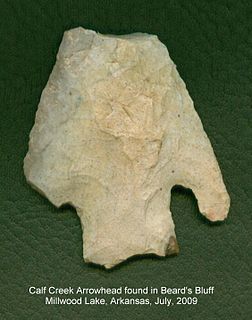
Calf Creek Culture was a nomadic hunter-gatherer people who lived in the southcentral region of North America, especially in the area of what is today Oklahoma and surrounding states, artifacts having been found in such places as Beard's Bluff, Arkansas and Sand Springs, Oklahoma. The Calf Creek culture was active during the early to middle Archaic period in the Americas, approximately 7,500 to 4,000 years ago.
Deer Creek Public Schools serves students in northwestern Oklahoma County and southwestern Logan County in Oklahoma. As of October 2018, the district enrolls 6,646 students.

The Muscogee (Creek) Nation, rebranded in May of 2021 as simply the Muscogee Nation, is a federally recognized Native American tribe based in the U.S. state of Oklahoma. The nation descends from the historic Creek Confederacy, a large group of indigenous peoples of the Southeastern Woodlands. Official languages include Muscogee, Yuchi, Natchez, Alabama, and Koasati, with Muscogee retaining the largest number of speakers. They commonly refer to themselves as Este Mvskokvlke. Historically, they were often referred to by European Americans as one of the Five Civilized Tribes of the American Southeast.

During the American Civil War, most of what is now the U.S. state of Oklahoma was designated as the Indian Territory. It served as an unorganized region that had been set aside specifically for Native American tribes and was occupied mostly by tribes which had been removed from their ancestral lands in the Southeastern United States following the Indian Removal Act of 1830. As part of the Trans-Mississippi Theater, the Indian Territory was the scene of numerous skirmishes and seven officially recognized battles involving both Native American units allied with the Confederate States of America and Native Americans loyal to the United States government, as well as other Union and Confederate troops.
On the eve of the American Civil War in 1861, a significant number of Indigenous peoples of the Americas had been relocated from the Southeastern United States to Indian Territory, west of the Mississippi. The inhabitants of the eastern part of the Indian Territory, the Five Civilized Tribes, were suzerain nations with established tribal governments, well established cultures, and legal systems that allowed for slavery. Before European Contact these tribes were generally matriarchial societies, with agriculture being the primary economic pursuit. The bulk of the tribes lived in towns with planned streets, residential and public areas. The people were ruled by complex hereditary chiefdoms of varying size and complexity with high levels of military organization.
Sharp v. Murphy, 591 U.S. ___ (2020), was a Supreme Court of the United States case of whether Congress disestablished the Muscogee (Creek) Nation reservation. After holding the case from the 2018 term, the case was decided on July 9, 2020, in a per curiam decision following McGirt v. Oklahoma that, for the purposes of the Major Crimes Act, the reservations were never disestablished and remain Native American country.
References
- ↑ "Oklahoma Gulf". Geographic Names Information System . United States Geological Survey . Retrieved 2017-10-31.CS1 maint: discouraged parameter (link)